2023年中考英语一轮复习完形填空专项练(四)文化类(含解析)
文档属性
| 名称 | 2023年中考英语一轮复习完形填空专项练(四)文化类(含解析) |
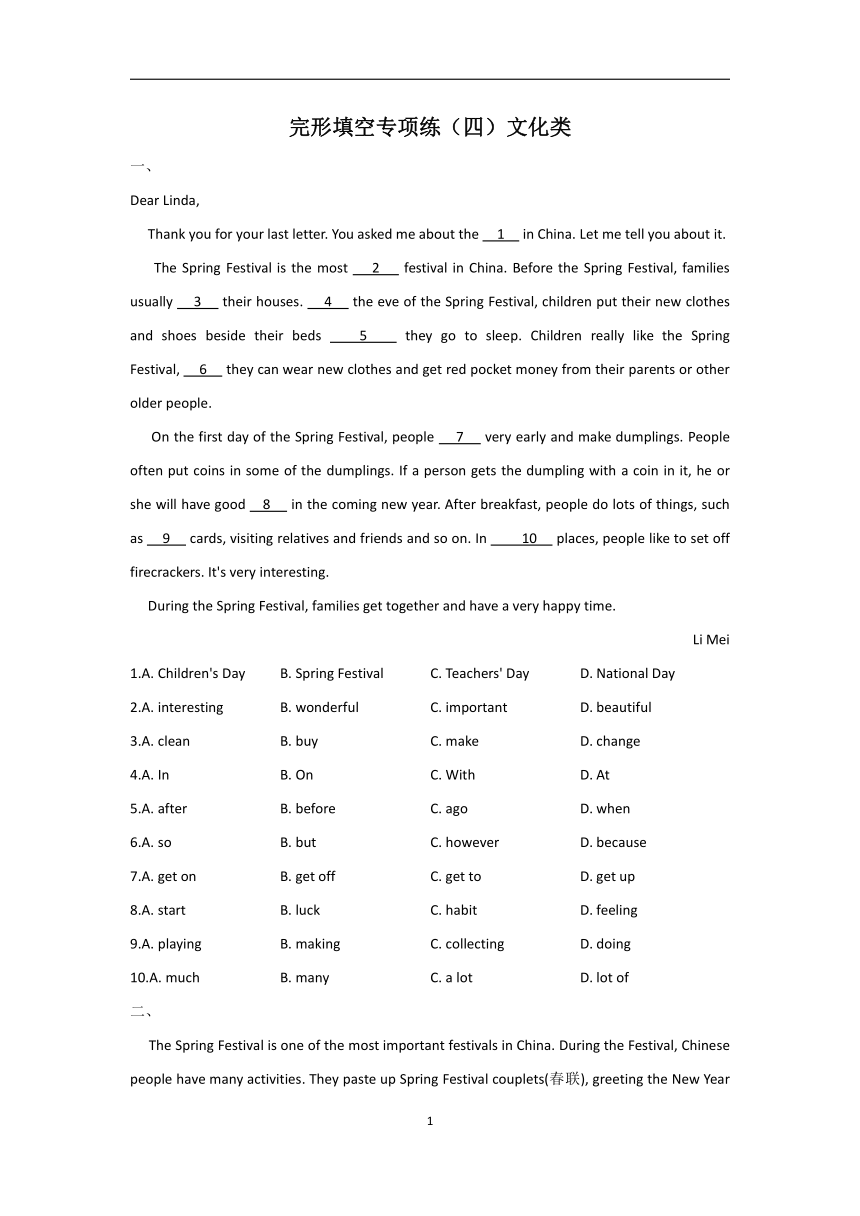
|
|
| 格式 | doc | ||
| 文件大小 | 27.9KB | ||
| 资源类型 | 教案 | ||
| 版本资源 | 通用版 | ||
| 科目 | 英语 | ||
| 更新时间 | 2023-03-20 00:00:00 | ||
图片预览

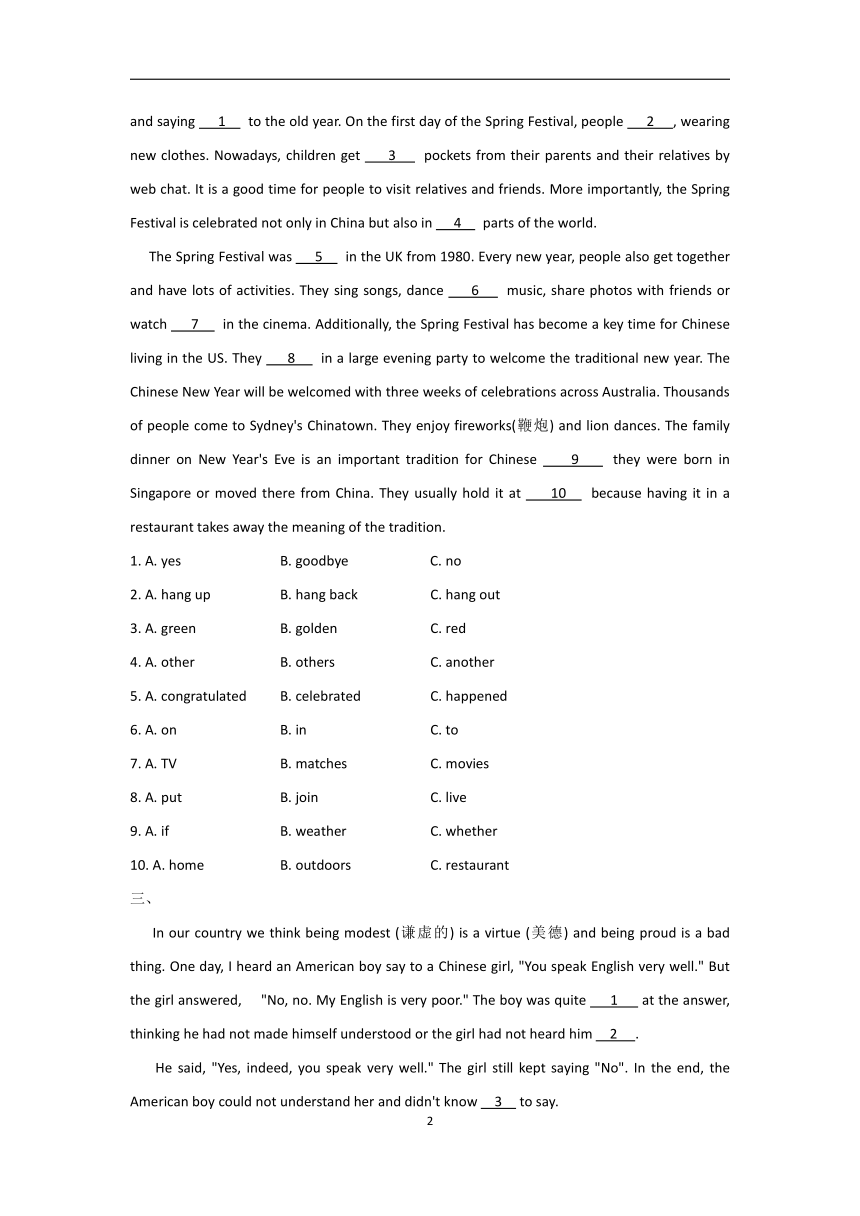
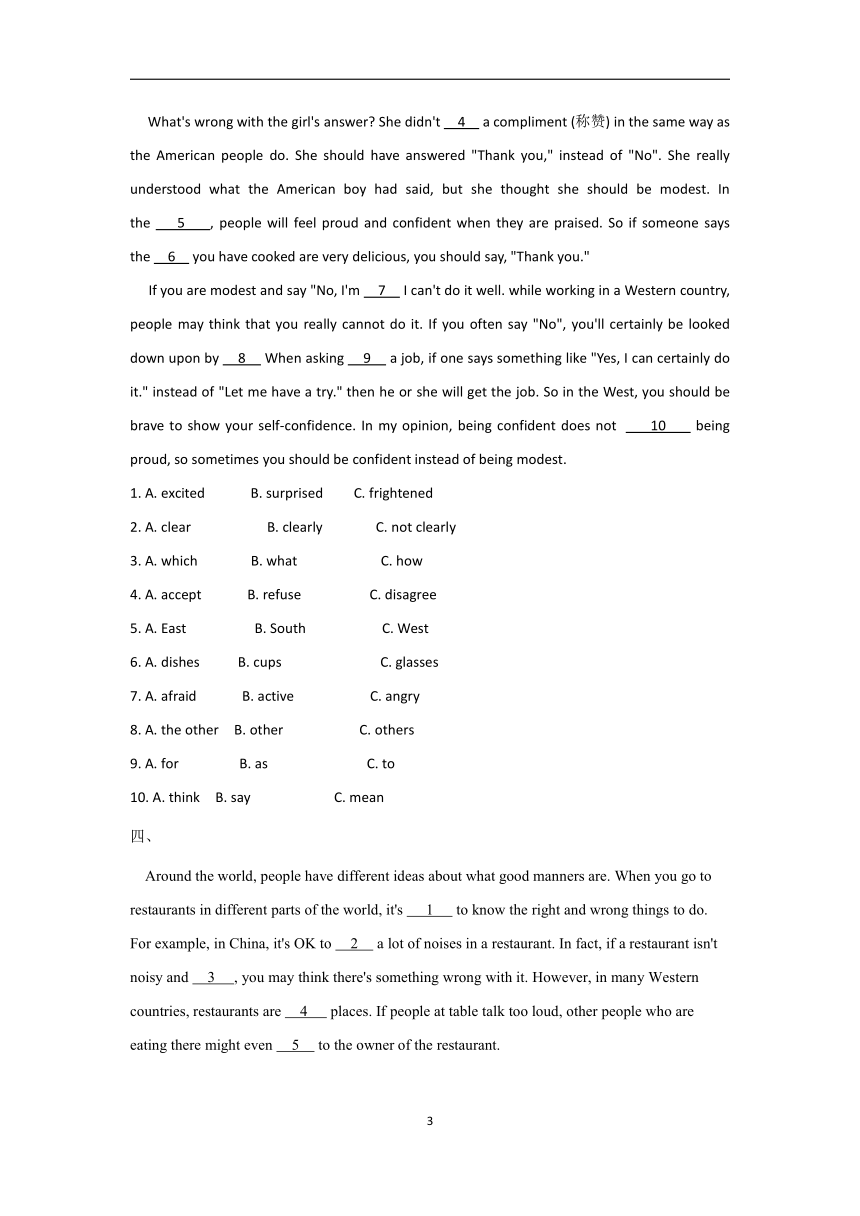
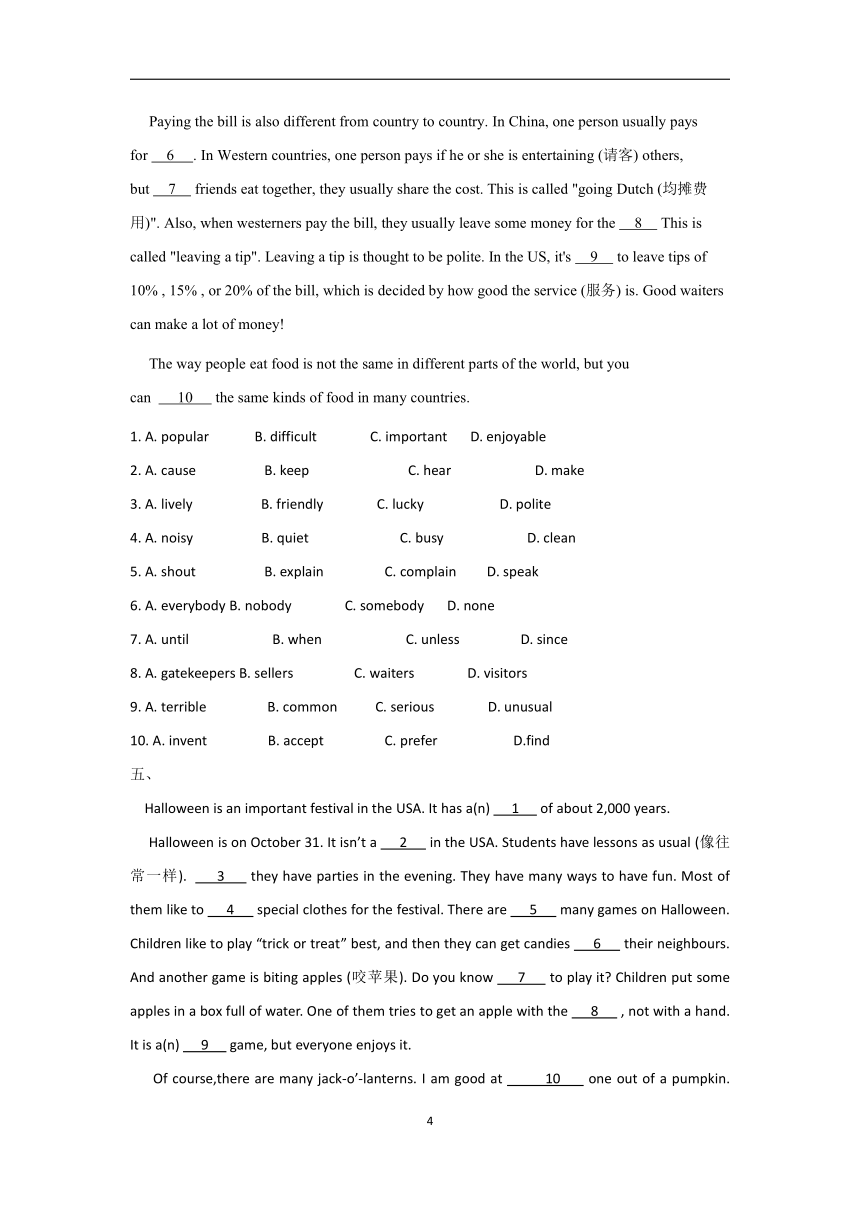
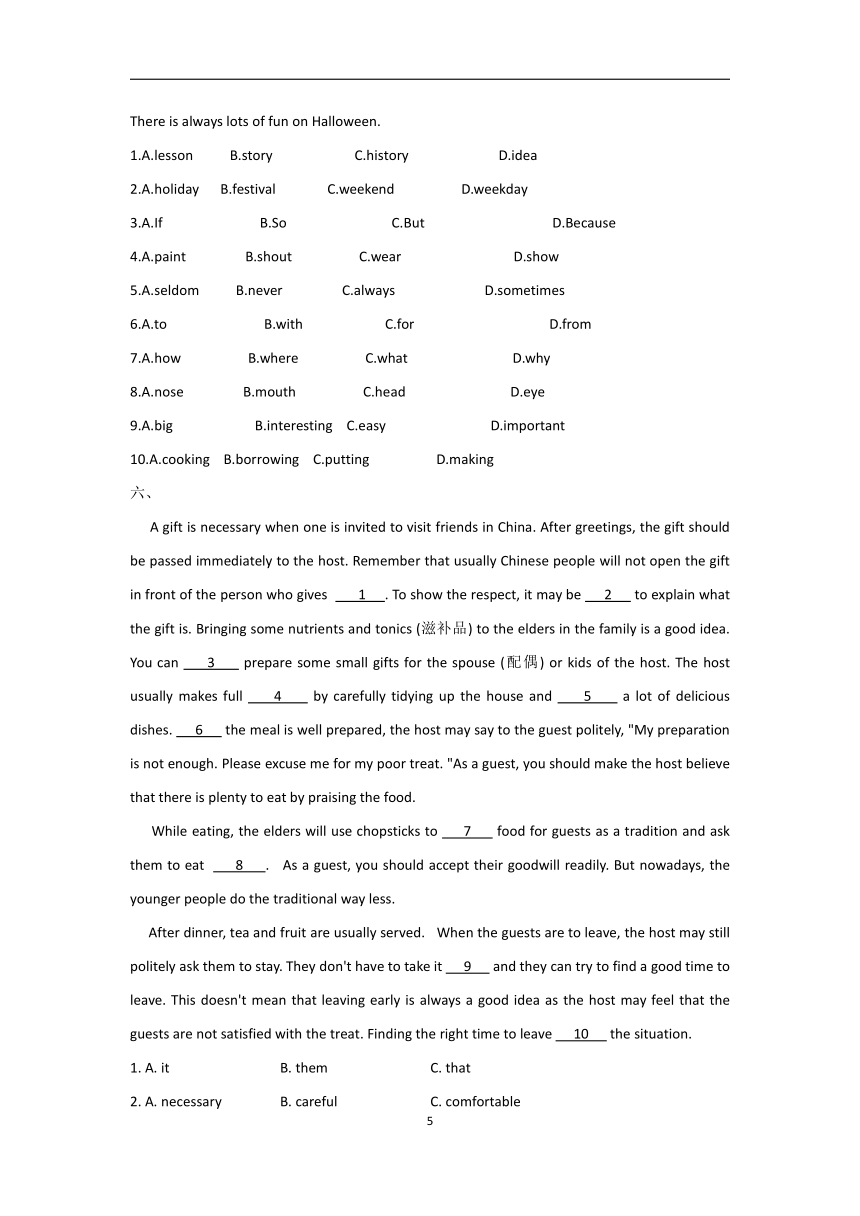
文档简介
完形填空专项练(四)文化类
一、
Dear Linda,
Thank you for your last letter. You asked me about the 1 in China. Let me tell you about it.
The Spring Festival is the most 2 festival in China. Before the Spring Festival, families usually 3 their houses. 4 the eve of the Spring Festival, children put their new clothes and shoes beside their beds 5 they go to sleep. Children really like the Spring Festival, 6 they can wear new clothes and get red pocket money from their parents or other older people.
On the first day of the Spring Festival, people 7 very early and make dumplings. People often put coins in some of the dumplings. If a person gets the dumpling with a coin in it, he or she will have good 8 in the coming new year. After breakfast, people do lots of things, such as 9 cards, visiting relatives and friends and so on. In 10 places, people like to set off firecrackers. It's very interesting.
During the Spring Festival, families get together and have a very happy time.
Li Mei
1.A. Children's Day B. Spring Festival C. Teachers' Day D. National Day
2.A. interesting B. wonderful C. important D. beautiful
3.A. clean B. buy C. make D. change
4.A. In B. On C. With D. At
5.A. after B. before C. ago D. when
6.A. so B. but C. however D. because
7.A. get on B. get off C. get to D. get up
8.A. start B. luck C. habit D. feeling
9.A. playing B. making C. collecting D. doing
10.A. much B. many C. a lot D. lot of
二、
The Spring Festival is one of the most important festivals in China. During the Festival, Chinese people have many activities. They paste up Spring Festival couplets(春联), greeting the New Year and saying 1 to the old year. On the first day of the Spring Festival, people 2 , wearing new clothes. Nowadays, children get 3 pockets from their parents and their relatives by web chat. It is a good time for people to visit relatives and friends. More importantly, the Spring Festival is celebrated not only in China but also in 4 parts of the world.
The Spring Festival was 5 in the UK from 1980. Every new year, people also get together and have lots of activities. They sing songs, dance 6 music, share photos with friends or watch 7 in the cinema. Additionally, the Spring Festival has become a key time for Chinese living in the US. They 8 in a large evening party to welcome the traditional new year. The Chinese New Year will be welcomed with three weeks of celebrations across Australia. Thousands of people come to Sydney's Chinatown. They enjoy fireworks(鞭炮) and lion dances. The family dinner on New Year's Eve is an important tradition for Chinese 9 they were born in Singapore or moved there from China. They usually hold it at 10 because having it in a restaurant takes away the meaning of the tradition.
1. A. yes B. goodbye C. no
2. A. hang up B. hang back C. hang out
3. A. green B. golden C. red
4. A. other B. others C. another
5. A. congratulated B. celebrated C. happened
6. A. on B. in C. to
7. A. TV B. matches C. movies
8. A. put B. join C. live
9. A. if B. weather C. whether
10. A. home B. outdoors C. restaurant
三、
In our country we think being modest (谦虚的) is a virtue (美德) and being proud is a bad thing. One day, I heard an American boy say to a Chinese girl, "You speak English very well." But the girl answered, "No, no. My English is very poor." The boy was quite 1 at the answer, thinking he had not made himself understood or the girl had not heard him 2 .
He said, "Yes, indeed, you speak very well." The girl still kept saying "No". In the end, the American boy could not understand her and didn't know 3 to say.
What's wrong with the girl's answer She didn't 4 a compliment (称赞) in the same way as the American people do. She should have answered "Thank you," instead of "No". She really understood what the American boy had said, but she thought she should be modest. In the 5 , people will feel proud and confident when they are praised. So if someone says the 6 you have cooked are very delicious, you should say, "Thank you."
If you are modest and say "No, I'm 7 I can't do it well. while working in a Western country, people may think that you really cannot do it. If you often say "No", you'll certainly be looked down upon by 8 When asking 9 a job, if one says something like "Yes, I can certainly do it." instead of "Let me have a try." then he or she will get the job. So in the West, you should be brave to show your self-confidence. In my opinion, being confident does not 10 being proud, so sometimes you should be confident instead of being modest.
1. A. excited B. surprised C. frightened
2. A. clear B. clearly C. not clearly
3. A. which B. what C. how
4. A. accept B. refuse C. disagree
5. A. East B. South C. West
6. A. dishes B. cups C. glasses
7. A. afraid B. active C. angry
8. A. the other B. other C. others
9. A. for B. as C. to
10. A. think B. say C. mean
四、
Around the world, people have different ideas about what good manners are. When you go to restaurants in different parts of the world, it's 1 to know the right and wrong things to do. For example, in China, it's OK to 2 a lot of noises in a restaurant. In fact, if a restaurant isn't noisy and 3 , you may think there's something wrong with it. However, in many Western countries, restaurants are 4 places. If people at table talk too loud, other people who are eating there might even 5 to the owner of the restaurant.
Paying the bill is also different from country to country. In China, one person usually pays for 6 . In Western countries, one person pays if he or she is entertaining (请客) others, but 7 friends eat together, they usually share the cost. This is called "going Dutch (均摊费用)". Also, when westerners pay the bill, they usually leave some money for the 8 This is called "leaving a tip". Leaving a tip is thought to be polite. In the US, it's 9 to leave tips of 10% , 15% , or 20% of the bill, which is decided by how good the service (服务) is. Good waiters can make a lot of money!
The way people eat food is not the same in different parts of the world, but you can 10 the same kinds of food in many countries.
1. A. popular B. difficult C. important D. enjoyable
2. A. cause B. keep C. hear D. make
3. A. lively B. friendly C. lucky D. polite
4. A. noisy B. quiet C. busy D. clean
5. A. shout B. explain C. complain D. speak
6. A. everybody B. nobody C. somebody D. none
7. A. until B. when C. unless D. since
8. A. gatekeepers B. sellers C. waiters D. visitors
9. A. terrible B. common C. serious D. unusual
10. A. invent B. accept C. prefer D.find
五、
Halloween is an important festival in the USA. It has a(n) 1 of about 2,000 years.
Halloween is on October 31. It isn’t a 2 in the USA. Students have lessons as usual (像往常一样). 3 they have parties in the evening. They have many ways to have fun. Most of them like to 4 special clothes for the festival. There are 5 many games on Halloween. Children like to play “trick or treat” best, and then they can get candies 6 their neighbours. And another game is biting apples (咬苹果). Do you know 7 to play it Children put some apples in a box full of water. One of them tries to get an apple with the 8 , not with a hand. It is a(n) 9 game, but everyone enjoys it.
Of course,there are many jack-o’-lanterns. I am good at 10 one out of a pumpkin. There is always lots of fun on Halloween.
1.A.lesson B.story C.history D.idea
2.A.holiday B.festival C.weekend D.weekday
3.A.If B.So C.But D.Because
4.A.paint B.shout C.wear D.show
5.A.seldom B.never C.always D.sometimes
6.A.to B.with C.for D.from
7.A.how B.where C.what D.why
8.A.nose B.mouth C.head D.eye
9.A.big B.interesting C.easy D.important
10.A.cooking B.borrowing C.putting D.making
六、
A gift is necessary when one is invited to visit friends in China. After greetings, the gift should be passed immediately to the host. Remember that usually Chinese people will not open the gift in front of the person who gives 1 . To show the respect, it may be 2 to explain what the gift is. Bringing some nutrients and tonics (滋补品) to the elders in the family is a good idea. You can 3 prepare some small gifts for the spouse (配偶) or kids of the host. The host usually makes full 4 by carefully tidying up the house and 5 a lot of delicious dishes. 6 the meal is well prepared, the host may say to the guest politely, "My preparation is not enough. Please excuse me for my poor treat. "As a guest, you should make the host believe that there is plenty to eat by praising the food.
While eating, the elders will use chopsticks to 7 food for guests as a tradition and ask them to eat 8 . As a guest, you should accept their goodwill readily. But nowadays, the younger people do the traditional way less.
After dinner, tea and fruit are usually served. When the guests are to leave, the host may still politely ask them to stay. They don't have to take it 9 and they can try to find a good time to leave. This doesn't mean that leaving early is always a good idea as the host may feel that the guests are not satisfied with the treat. Finding the right time to leave 10 the situation.
1. A. it B. them C. that
2. A. necessary B. careful C. comfortable
3. A. too B. also C. either
4. A. plans B. decisions C. preparations
5. A. enjoying B. cooking C. washing
6. A. But B. Although C. Because
7. A. cut up B. eat up C. pick up
8. A. more B. less C. many
9. A. completely B. seriously C. probably
10. A. works out B. sticks to C. depends on
七、
Every April, there is a special day in China. It is called Qingming Festival, also called Tomb -Sweeping Day. on that the day, people 1 and honor (纪念) their ancestors (祖先).Qingming is a(n) 2 Chinese festival. It has a long history. It began over 2,000 years ago. A famous poem 3 the Tang Dynasty poet Du Mu describes the day: "Rains fall heavily as Qingming comes, and passers-by(行人) with lowered sprits go."
Tomb-Sweeping Day has been a public 4 on the Chinese mainland(中国大陆) since 2008. On this day, 5 bring flowers, food and wine to their ancestors' tombs (坟墓). They put food like cakes and fruits in front of the tombs. After that, they 6 the dirt off the tombs and remember their dead family members.
7 do Chinese people do this That's because people think that visiting tombs to 8 respect (尊重) to their dead family members.
However, Tomb-Sweeping Day is not only about this. During that time, the weather is becoming 9 . People are also able to garden (从事园艺)and enjoy outdoor activities. Families often 10 for outings (远足) or fly kites at this time.
1. A. remember B. meet C. see D. find
2. A. popular B. famous C. traditional D. unhappy
3. A. for B. by C. with D. as
4. A. weekend B. weekday C. journey D. holiday
5. A. classes B. families C. friends D. groups
6. A. turn B. keep C. sweep D. go
7. A. Why B. When C. Where D. Who
8. A. bring B. show C. make D. take
9. A. warmer B. colder C. cooler D. shorter
10. A. have fun B. work hard C. pull together D. get together
答案以及解析
一、
答案:1-5 BCABB 6-10 DDBAB
解析:1.根据下文" The spring Festival is the most..."可知,说的是关于春节的事。
2.句意:春节是中国最重要的节日。
3.句意:在春节来临前,人们通常打扫屋子。
4.这里指的是在除夕这一天,所以用介词on。
5.句意:在睡觉前孩子们准备好新衣新鞋,并放在床边。
6.此处介绍了孩子们喜欢春节的原因。
7.句意:春节第一天人们起床很早,然后开始包饺子。
8.句意:如果人们吃到了带硬币的饺子,那么他们新年里会交好运。
9.这里是列举了打牌、拜访亲戚朋友等等活动。
10.因为后面 places是可数名词复数,因此用many来修饰。
二、
答案:1-5 BCCAB 6-10 CCBCA
解析:本文是一篇说明文,主要介绍了春节的风俗、意义及其他国家过春节的情况。
1.根据and前后的New Year和old year可知春节是辞旧迎新的节日。say goodbye to...意为"对……说再见"。故选B项。
2.句意为:在春节第一天,人们穿着新衣服闲呆着。由语境可知选C项,hang out意为"闲呆"。
3.此处表示孩子们会得到红包。red pocket意为"红包"。故选C项。
4.根据空前的the Spring Festival is celebrated not only in China可知不仅中国庆祝春节,世界上的其他地方也庆祝春节。other修饰可数名词复数; others相当于"other+复数名词"; another表示"另一个",修饰单数名词。故选A项。
5. congratulate 意为"祝贺"; celebrate意为"庆祝"; happen意为"发生"。此处表示"从1980年开始,英国也庆祝春节"。故选B项。
6. dance to music表示"随着音乐跳舞"。故选C项。
7.根据in the cinema可知应是看电影。故选C项。
8.根据空后的a large evening party可推断这里是指参加大型的晚会来迎接传统的新年。join in意为"参加",符合语境,故选B项。
9.句意为:对于不管是出生在新加坡还是从中国搬到那里的中国人来说,年夜饭是一个重要的传统。whether...or...表示"不管……还是……",故选C项。
10.根据语境可推断此处是解释为什么在家吃年夜饭而不是在饭店。故选A项。
三、
答案:BBBAC AACAC
解析:1.上文提到男孩称赞女孩英文说得很好,而女孩谦虚地回答自己的英文不好。下文表示男孩认为女孩没有理解自己,由此可推断,美国男孩对中国女孩的回答非常吃惊。故选B项。
2.设空处修饰动词,应用副词。根据语境可知,此处表达肯定含义,故选B项。
3.根据语境可知,此处表示"不知道说什么",故用what。
4.句意为:她没有像美国人那样以同样的方式接受称赞。accept 意为"接受";refuse意为"拒绝";disagree意为"不同意"。联系上下文可知,accept符合语境。故选A项。
5.根据语境可知,此处表示"在西方,当人们被称赞时,他们会感到自豪和自信"。故选C项。
6.根据空后的you have cooked可知此处应选dishes。故选 A项。
7.根据语境可知此处表示"恐怕我做不好"故选A项。
8.此处表示"你肯定会被他人轻视"。others为代词,泛指其他 人,符合语境。故选C项。
9.ask for a job意为"找工作",符合语境,故选A项。
10.句意为:在我看来,自信不意味着自负……mean意为"意味着",符合语境。故选C项。
四、
答案:CDABC ABCBD
解析:1.下文主要对在餐馆就餐时中国和西方国家的差异进行说所以此处应是表达去世界上不同地方的餐馆就餐时,知道做什么事是正确的、做什么事是错误的很重要。故选C项。
2. make (a lot of) noises是固定用法,意为"制造(大量)噪声",符合语境,故选D项。
3. lively意为"活跃的;生气勃勃的";friendly意为"友好的"; lucky意为"幸运的";polite意为"有礼貌的"。此处和noisy表达类似含义,故选A项。
4.由However可知,前后内容为转折关系,由前面的内容可此处应表示"安静的"。故选B项。
5. shout意为"大喊";explain意为"解释";complain意为"抱 "; speak意为"说话;讲话"。根据语境可知,此处指"向餐馆老板抱怨(太吵)",故选C项。
6.根据上文提到的每个国家付款的习惯不同及后文讲西方人均摊费用可推测,此处指在中国一个人通常支付所有人的费用。 故用 everybody。
7.此处是指"但当朋友一起吃饭时,他们通常分摊费用"。 when意为"当……的时候",符合语境,故选B项。
8. 根据本段最后一句"Good waiters can make a lot of money!"可知,此处是指给服务员小费。故选C项。
9. 根据空后的 which is decided by how good the service is 与 "Good waiters can make a lot of money!"可知,在美国付小费是很普遍的。故选B项。
10.此处表示"你会在许多国家找到相同种类的食物"。invent 意为"发明";accept意为"接受";prefer意为"更喜欢";find意 为"发现;找到"。故选D项。
五、
答案:1.C; 2.A; 3.C; 4.C; 5.C; 6.D; 7.A; 8.B; 9.C; 10.D
解析:1.C句意为:它有大约2,000年的历史。lesson意为"课;教训"; story意为"故事";history意为"历史"idea意为"主意;想法"。 根据空后的2,000 years可知应选C项。
2.A 根据后一句"Students have lessons as usual." 可知,此处表达"万圣节不是一个假期"。holiday意为"假期" ; festival意为"节日" ;weekend意为"周末";weekday意为"工作日"。故选A项。
3.C前一句话表达"学生们像往常一样上课",本句表达"他们在晚上举办聚会",故可知设空处前后文为转折关系,应用But。 故选C项。
4.C根据空后的special clothes可知,此处表达"大多数学生喜欢为万圣节穿特殊的衣服"。paint意为"画";shout意为"喊"; wear意为"穿";show意为"展示"。故选C项。
5.C句意为:在万圣节总是有很多游戏。seldom意为"很少"; never意为"从不";always意为"总是";sometimes意为"有时"。 根据下文对各种活动的介绍可知应选C项。
6.D句意为:孩子们最喜欢玩"不给糖就捣蛋"游戏,然后他们就奇以从他们的邻居那里得到糖果。from意为"来自;从",符合语境。故选D项。
7.A句意为:你知道怎么玩这个游戏吗 根据语境,故选A项。
8.B根据上文中提到的biting apples可知应选B项。
9.C句意为:它是一个简单的游戏,但是每个人都喜欢它。根据语境可知,此处表达"简单的游戏",故选C项。
10.D根据语境可知,此处表达"我撞长用南瓜做南瓜灯"。cook为"烹调" ;borrow意为"借";put意为"放置";make意为"制作"。结合语境,故选D项。
六、
答案:AABCB BCABC
解析:1. A【解析】根据文意可知, 收到礼物的时候, 中国人通常不会当面打开它, 此处所缺的词是it, 代指的是the gift.
2. A【解析】为了表示尊重, 解释一下礼物是什么或许是有必要的, 故所缺的词是necessary. careful仔细的, 细心的; comfortable舒服的.
3. B【解析】also表示"也", 用在主要动词之前. too一般用在句末; either表示"也", 一般用在否定句中.
4. C【解析】主人通常会做充分的准备工作, 故所缺的词是preparations. plan 计划; decision决定.
5. B【解析】主人会仔细地打扫房屋并做许多美味的菜肴, 故cooking符合文意.
6. B【解析】尽管食物是经过精心准备的, 但主人或许会礼貌地对客人说一些准备不充分之类的话, 故所缺的连词是Although.
7. C【解析】cut up 切碎; eat up 吃完; pick up捡起, 拿起. 在吃饭时, 作为一个传统, 年长的人会用筷子为客人夹菜, 故符合文意的短语是pick up.
8. A【解析】为客人夹菜的目的是让他们多吃一些, 故所缺的词是more.
9. B【解析】客人对主人的挽留不必太当真, take it seriously意为"认真对待, 当真", 故所缺的词是seriously. completely完全地; probably可能.
10. C【解析】work out 算出, 解决; stick to 坚持; depend on依靠, 由……而定. 根据上文的描述可推断, 找到离开的合适时机要视具体情况而定, 故答案为C.
七、
答案:1.A; 2.C; 3.B; 4.D; 5.B; 6.C; 7.A; 8.B; 9.A; 10.D
解析:1.句意:在那天人们纪念他们的祖先。A纪念,B遇到,C看到,D发现,根据 and honor (纪念) their ancestors 可知是纪念,故选A。
2.句意:清明节是中国的传统节日。A流行的,B著名的,C传统的,D不开心的,根据 It has a long history , 可知是传统的,故选C。
3.句意:唐代诗人杜牧的一首名诗描述了这一天:"清明时节雨纷纷,路上行人欲断魂"A为了,B被,C有,D作为,此处表示被某人写的诗,故选B。
4.句意:清明节自2008年以来一直是中国大陆的公共假日。A周末,B平时,C旅程,D假日,根据 It is called Qingming Festival ,可知这是个假日,故选D。
5.句意:家人们开来花,食物和酒来给他们的祖先扫墓。A课,B家庭,C朋友,D组,根据 ancestors' tombs ,可知家人纪念祖先,故选B。
6.句意:在那之后,他们清扫坟墓上的泥土,并记起他们死去的家人。A翻转,B保持,C打扫,D去,根据 dirt off the tombs, 可知是打扫,清理的意思,故选C。
7.句意:中国人为什么这么做呢 A为什么,B当……的时候,C哪里,D谁,根据 That's because 可知是为什么,故选A。
8.句意:这是因为人们认为拜访坟墓是为了向死去的家人表示尊重。A带了,B显示,C制作,D拿走,show respect to sb,固定搭配,向某人表达尊敬,故选B。
9.句意:在那期间,天气越来越暖和了。A温暖的,B寒冷的,C凉爽的,D短的,根据 enjoy outdoor activities 可知指天气温暖适合户外活动,故选A。
10.句意:家庭经常在这个时候聚在一起外出或放风筝。A玩得开心,B努力工作,C 齐心协力 ,D相聚,根据 outings or fly kites at this time,可知聚在一起 ,故选D。
2
一、
Dear Linda,
Thank you for your last letter. You asked me about the 1 in China. Let me tell you about it.
The Spring Festival is the most 2 festival in China. Before the Spring Festival, families usually 3 their houses. 4 the eve of the Spring Festival, children put their new clothes and shoes beside their beds 5 they go to sleep. Children really like the Spring Festival, 6 they can wear new clothes and get red pocket money from their parents or other older people.
On the first day of the Spring Festival, people 7 very early and make dumplings. People often put coins in some of the dumplings. If a person gets the dumpling with a coin in it, he or she will have good 8 in the coming new year. After breakfast, people do lots of things, such as 9 cards, visiting relatives and friends and so on. In 10 places, people like to set off firecrackers. It's very interesting.
During the Spring Festival, families get together and have a very happy time.
Li Mei
1.A. Children's Day B. Spring Festival C. Teachers' Day D. National Day
2.A. interesting B. wonderful C. important D. beautiful
3.A. clean B. buy C. make D. change
4.A. In B. On C. With D. At
5.A. after B. before C. ago D. when
6.A. so B. but C. however D. because
7.A. get on B. get off C. get to D. get up
8.A. start B. luck C. habit D. feeling
9.A. playing B. making C. collecting D. doing
10.A. much B. many C. a lot D. lot of
二、
The Spring Festival is one of the most important festivals in China. During the Festival, Chinese people have many activities. They paste up Spring Festival couplets(春联), greeting the New Year and saying 1 to the old year. On the first day of the Spring Festival, people 2 , wearing new clothes. Nowadays, children get 3 pockets from their parents and their relatives by web chat. It is a good time for people to visit relatives and friends. More importantly, the Spring Festival is celebrated not only in China but also in 4 parts of the world.
The Spring Festival was 5 in the UK from 1980. Every new year, people also get together and have lots of activities. They sing songs, dance 6 music, share photos with friends or watch 7 in the cinema. Additionally, the Spring Festival has become a key time for Chinese living in the US. They 8 in a large evening party to welcome the traditional new year. The Chinese New Year will be welcomed with three weeks of celebrations across Australia. Thousands of people come to Sydney's Chinatown. They enjoy fireworks(鞭炮) and lion dances. The family dinner on New Year's Eve is an important tradition for Chinese 9 they were born in Singapore or moved there from China. They usually hold it at 10 because having it in a restaurant takes away the meaning of the tradition.
1. A. yes B. goodbye C. no
2. A. hang up B. hang back C. hang out
3. A. green B. golden C. red
4. A. other B. others C. another
5. A. congratulated B. celebrated C. happened
6. A. on B. in C. to
7. A. TV B. matches C. movies
8. A. put B. join C. live
9. A. if B. weather C. whether
10. A. home B. outdoors C. restaurant
三、
In our country we think being modest (谦虚的) is a virtue (美德) and being proud is a bad thing. One day, I heard an American boy say to a Chinese girl, "You speak English very well." But the girl answered, "No, no. My English is very poor." The boy was quite 1 at the answer, thinking he had not made himself understood or the girl had not heard him 2 .
He said, "Yes, indeed, you speak very well." The girl still kept saying "No". In the end, the American boy could not understand her and didn't know 3 to say.
What's wrong with the girl's answer She didn't 4 a compliment (称赞) in the same way as the American people do. She should have answered "Thank you," instead of "No". She really understood what the American boy had said, but she thought she should be modest. In the 5 , people will feel proud and confident when they are praised. So if someone says the 6 you have cooked are very delicious, you should say, "Thank you."
If you are modest and say "No, I'm 7 I can't do it well. while working in a Western country, people may think that you really cannot do it. If you often say "No", you'll certainly be looked down upon by 8 When asking 9 a job, if one says something like "Yes, I can certainly do it." instead of "Let me have a try." then he or she will get the job. So in the West, you should be brave to show your self-confidence. In my opinion, being confident does not 10 being proud, so sometimes you should be confident instead of being modest.
1. A. excited B. surprised C. frightened
2. A. clear B. clearly C. not clearly
3. A. which B. what C. how
4. A. accept B. refuse C. disagree
5. A. East B. South C. West
6. A. dishes B. cups C. glasses
7. A. afraid B. active C. angry
8. A. the other B. other C. others
9. A. for B. as C. to
10. A. think B. say C. mean
四、
Around the world, people have different ideas about what good manners are. When you go to restaurants in different parts of the world, it's 1 to know the right and wrong things to do. For example, in China, it's OK to 2 a lot of noises in a restaurant. In fact, if a restaurant isn't noisy and 3 , you may think there's something wrong with it. However, in many Western countries, restaurants are 4 places. If people at table talk too loud, other people who are eating there might even 5 to the owner of the restaurant.
Paying the bill is also different from country to country. In China, one person usually pays for 6 . In Western countries, one person pays if he or she is entertaining (请客) others, but 7 friends eat together, they usually share the cost. This is called "going Dutch (均摊费用)". Also, when westerners pay the bill, they usually leave some money for the 8 This is called "leaving a tip". Leaving a tip is thought to be polite. In the US, it's 9 to leave tips of 10% , 15% , or 20% of the bill, which is decided by how good the service (服务) is. Good waiters can make a lot of money!
The way people eat food is not the same in different parts of the world, but you can 10 the same kinds of food in many countries.
1. A. popular B. difficult C. important D. enjoyable
2. A. cause B. keep C. hear D. make
3. A. lively B. friendly C. lucky D. polite
4. A. noisy B. quiet C. busy D. clean
5. A. shout B. explain C. complain D. speak
6. A. everybody B. nobody C. somebody D. none
7. A. until B. when C. unless D. since
8. A. gatekeepers B. sellers C. waiters D. visitors
9. A. terrible B. common C. serious D. unusual
10. A. invent B. accept C. prefer D.find
五、
Halloween is an important festival in the USA. It has a(n) 1 of about 2,000 years.
Halloween is on October 31. It isn’t a 2 in the USA. Students have lessons as usual (像往常一样). 3 they have parties in the evening. They have many ways to have fun. Most of them like to 4 special clothes for the festival. There are 5 many games on Halloween. Children like to play “trick or treat” best, and then they can get candies 6 their neighbours. And another game is biting apples (咬苹果). Do you know 7 to play it Children put some apples in a box full of water. One of them tries to get an apple with the 8 , not with a hand. It is a(n) 9 game, but everyone enjoys it.
Of course,there are many jack-o’-lanterns. I am good at 10 one out of a pumpkin. There is always lots of fun on Halloween.
1.A.lesson B.story C.history D.idea
2.A.holiday B.festival C.weekend D.weekday
3.A.If B.So C.But D.Because
4.A.paint B.shout C.wear D.show
5.A.seldom B.never C.always D.sometimes
6.A.to B.with C.for D.from
7.A.how B.where C.what D.why
8.A.nose B.mouth C.head D.eye
9.A.big B.interesting C.easy D.important
10.A.cooking B.borrowing C.putting D.making
六、
A gift is necessary when one is invited to visit friends in China. After greetings, the gift should be passed immediately to the host. Remember that usually Chinese people will not open the gift in front of the person who gives 1 . To show the respect, it may be 2 to explain what the gift is. Bringing some nutrients and tonics (滋补品) to the elders in the family is a good idea. You can 3 prepare some small gifts for the spouse (配偶) or kids of the host. The host usually makes full 4 by carefully tidying up the house and 5 a lot of delicious dishes. 6 the meal is well prepared, the host may say to the guest politely, "My preparation is not enough. Please excuse me for my poor treat. "As a guest, you should make the host believe that there is plenty to eat by praising the food.
While eating, the elders will use chopsticks to 7 food for guests as a tradition and ask them to eat 8 . As a guest, you should accept their goodwill readily. But nowadays, the younger people do the traditional way less.
After dinner, tea and fruit are usually served. When the guests are to leave, the host may still politely ask them to stay. They don't have to take it 9 and they can try to find a good time to leave. This doesn't mean that leaving early is always a good idea as the host may feel that the guests are not satisfied with the treat. Finding the right time to leave 10 the situation.
1. A. it B. them C. that
2. A. necessary B. careful C. comfortable
3. A. too B. also C. either
4. A. plans B. decisions C. preparations
5. A. enjoying B. cooking C. washing
6. A. But B. Although C. Because
7. A. cut up B. eat up C. pick up
8. A. more B. less C. many
9. A. completely B. seriously C. probably
10. A. works out B. sticks to C. depends on
七、
Every April, there is a special day in China. It is called Qingming Festival, also called Tomb -Sweeping Day. on that the day, people 1 and honor (纪念) their ancestors (祖先).Qingming is a(n) 2 Chinese festival. It has a long history. It began over 2,000 years ago. A famous poem 3 the Tang Dynasty poet Du Mu describes the day: "Rains fall heavily as Qingming comes, and passers-by(行人) with lowered sprits go."
Tomb-Sweeping Day has been a public 4 on the Chinese mainland(中国大陆) since 2008. On this day, 5 bring flowers, food and wine to their ancestors' tombs (坟墓). They put food like cakes and fruits in front of the tombs. After that, they 6 the dirt off the tombs and remember their dead family members.
7 do Chinese people do this That's because people think that visiting tombs to 8 respect (尊重) to their dead family members.
However, Tomb-Sweeping Day is not only about this. During that time, the weather is becoming 9 . People are also able to garden (从事园艺)and enjoy outdoor activities. Families often 10 for outings (远足) or fly kites at this time.
1. A. remember B. meet C. see D. find
2. A. popular B. famous C. traditional D. unhappy
3. A. for B. by C. with D. as
4. A. weekend B. weekday C. journey D. holiday
5. A. classes B. families C. friends D. groups
6. A. turn B. keep C. sweep D. go
7. A. Why B. When C. Where D. Who
8. A. bring B. show C. make D. take
9. A. warmer B. colder C. cooler D. shorter
10. A. have fun B. work hard C. pull together D. get together
答案以及解析
一、
答案:1-5 BCABB 6-10 DDBAB
解析:1.根据下文" The spring Festival is the most..."可知,说的是关于春节的事。
2.句意:春节是中国最重要的节日。
3.句意:在春节来临前,人们通常打扫屋子。
4.这里指的是在除夕这一天,所以用介词on。
5.句意:在睡觉前孩子们准备好新衣新鞋,并放在床边。
6.此处介绍了孩子们喜欢春节的原因。
7.句意:春节第一天人们起床很早,然后开始包饺子。
8.句意:如果人们吃到了带硬币的饺子,那么他们新年里会交好运。
9.这里是列举了打牌、拜访亲戚朋友等等活动。
10.因为后面 places是可数名词复数,因此用many来修饰。
二、
答案:1-5 BCCAB 6-10 CCBCA
解析:本文是一篇说明文,主要介绍了春节的风俗、意义及其他国家过春节的情况。
1.根据and前后的New Year和old year可知春节是辞旧迎新的节日。say goodbye to...意为"对……说再见"。故选B项。
2.句意为:在春节第一天,人们穿着新衣服闲呆着。由语境可知选C项,hang out意为"闲呆"。
3.此处表示孩子们会得到红包。red pocket意为"红包"。故选C项。
4.根据空前的the Spring Festival is celebrated not only in China可知不仅中国庆祝春节,世界上的其他地方也庆祝春节。other修饰可数名词复数; others相当于"other+复数名词"; another表示"另一个",修饰单数名词。故选A项。
5. congratulate 意为"祝贺"; celebrate意为"庆祝"; happen意为"发生"。此处表示"从1980年开始,英国也庆祝春节"。故选B项。
6. dance to music表示"随着音乐跳舞"。故选C项。
7.根据in the cinema可知应是看电影。故选C项。
8.根据空后的a large evening party可推断这里是指参加大型的晚会来迎接传统的新年。join in意为"参加",符合语境,故选B项。
9.句意为:对于不管是出生在新加坡还是从中国搬到那里的中国人来说,年夜饭是一个重要的传统。whether...or...表示"不管……还是……",故选C项。
10.根据语境可推断此处是解释为什么在家吃年夜饭而不是在饭店。故选A项。
三、
答案:BBBAC AACAC
解析:1.上文提到男孩称赞女孩英文说得很好,而女孩谦虚地回答自己的英文不好。下文表示男孩认为女孩没有理解自己,由此可推断,美国男孩对中国女孩的回答非常吃惊。故选B项。
2.设空处修饰动词,应用副词。根据语境可知,此处表达肯定含义,故选B项。
3.根据语境可知,此处表示"不知道说什么",故用what。
4.句意为:她没有像美国人那样以同样的方式接受称赞。accept 意为"接受";refuse意为"拒绝";disagree意为"不同意"。联系上下文可知,accept符合语境。故选A项。
5.根据语境可知,此处表示"在西方,当人们被称赞时,他们会感到自豪和自信"。故选C项。
6.根据空后的you have cooked可知此处应选dishes。故选 A项。
7.根据语境可知此处表示"恐怕我做不好"故选A项。
8.此处表示"你肯定会被他人轻视"。others为代词,泛指其他 人,符合语境。故选C项。
9.ask for a job意为"找工作",符合语境,故选A项。
10.句意为:在我看来,自信不意味着自负……mean意为"意味着",符合语境。故选C项。
四、
答案:CDABC ABCBD
解析:1.下文主要对在餐馆就餐时中国和西方国家的差异进行说所以此处应是表达去世界上不同地方的餐馆就餐时,知道做什么事是正确的、做什么事是错误的很重要。故选C项。
2. make (a lot of) noises是固定用法,意为"制造(大量)噪声",符合语境,故选D项。
3. lively意为"活跃的;生气勃勃的";friendly意为"友好的"; lucky意为"幸运的";polite意为"有礼貌的"。此处和noisy表达类似含义,故选A项。
4.由However可知,前后内容为转折关系,由前面的内容可此处应表示"安静的"。故选B项。
5. shout意为"大喊";explain意为"解释";complain意为"抱 "; speak意为"说话;讲话"。根据语境可知,此处指"向餐馆老板抱怨(太吵)",故选C项。
6.根据上文提到的每个国家付款的习惯不同及后文讲西方人均摊费用可推测,此处指在中国一个人通常支付所有人的费用。 故用 everybody。
7.此处是指"但当朋友一起吃饭时,他们通常分摊费用"。 when意为"当……的时候",符合语境,故选B项。
8. 根据本段最后一句"Good waiters can make a lot of money!"可知,此处是指给服务员小费。故选C项。
9. 根据空后的 which is decided by how good the service is 与 "Good waiters can make a lot of money!"可知,在美国付小费是很普遍的。故选B项。
10.此处表示"你会在许多国家找到相同种类的食物"。invent 意为"发明";accept意为"接受";prefer意为"更喜欢";find意 为"发现;找到"。故选D项。
五、
答案:1.C; 2.A; 3.C; 4.C; 5.C; 6.D; 7.A; 8.B; 9.C; 10.D
解析:1.C句意为:它有大约2,000年的历史。lesson意为"课;教训"; story意为"故事";history意为"历史"idea意为"主意;想法"。 根据空后的2,000 years可知应选C项。
2.A 根据后一句"Students have lessons as usual." 可知,此处表达"万圣节不是一个假期"。holiday意为"假期" ; festival意为"节日" ;weekend意为"周末";weekday意为"工作日"。故选A项。
3.C前一句话表达"学生们像往常一样上课",本句表达"他们在晚上举办聚会",故可知设空处前后文为转折关系,应用But。 故选C项。
4.C根据空后的special clothes可知,此处表达"大多数学生喜欢为万圣节穿特殊的衣服"。paint意为"画";shout意为"喊"; wear意为"穿";show意为"展示"。故选C项。
5.C句意为:在万圣节总是有很多游戏。seldom意为"很少"; never意为"从不";always意为"总是";sometimes意为"有时"。 根据下文对各种活动的介绍可知应选C项。
6.D句意为:孩子们最喜欢玩"不给糖就捣蛋"游戏,然后他们就奇以从他们的邻居那里得到糖果。from意为"来自;从",符合语境。故选D项。
7.A句意为:你知道怎么玩这个游戏吗 根据语境,故选A项。
8.B根据上文中提到的biting apples可知应选B项。
9.C句意为:它是一个简单的游戏,但是每个人都喜欢它。根据语境可知,此处表达"简单的游戏",故选C项。
10.D根据语境可知,此处表达"我撞长用南瓜做南瓜灯"。cook为"烹调" ;borrow意为"借";put意为"放置";make意为"制作"。结合语境,故选D项。
六、
答案:AABCB BCABC
解析:1. A【解析】根据文意可知, 收到礼物的时候, 中国人通常不会当面打开它, 此处所缺的词是it, 代指的是the gift.
2. A【解析】为了表示尊重, 解释一下礼物是什么或许是有必要的, 故所缺的词是necessary. careful仔细的, 细心的; comfortable舒服的.
3. B【解析】also表示"也", 用在主要动词之前. too一般用在句末; either表示"也", 一般用在否定句中.
4. C【解析】主人通常会做充分的准备工作, 故所缺的词是preparations. plan 计划; decision决定.
5. B【解析】主人会仔细地打扫房屋并做许多美味的菜肴, 故cooking符合文意.
6. B【解析】尽管食物是经过精心准备的, 但主人或许会礼貌地对客人说一些准备不充分之类的话, 故所缺的连词是Although.
7. C【解析】cut up 切碎; eat up 吃完; pick up捡起, 拿起. 在吃饭时, 作为一个传统, 年长的人会用筷子为客人夹菜, 故符合文意的短语是pick up.
8. A【解析】为客人夹菜的目的是让他们多吃一些, 故所缺的词是more.
9. B【解析】客人对主人的挽留不必太当真, take it seriously意为"认真对待, 当真", 故所缺的词是seriously. completely完全地; probably可能.
10. C【解析】work out 算出, 解决; stick to 坚持; depend on依靠, 由……而定. 根据上文的描述可推断, 找到离开的合适时机要视具体情况而定, 故答案为C.
七、
答案:1.A; 2.C; 3.B; 4.D; 5.B; 6.C; 7.A; 8.B; 9.A; 10.D
解析:1.句意:在那天人们纪念他们的祖先。A纪念,B遇到,C看到,D发现,根据 and honor (纪念) their ancestors 可知是纪念,故选A。
2.句意:清明节是中国的传统节日。A流行的,B著名的,C传统的,D不开心的,根据 It has a long history , 可知是传统的,故选C。
3.句意:唐代诗人杜牧的一首名诗描述了这一天:"清明时节雨纷纷,路上行人欲断魂"A为了,B被,C有,D作为,此处表示被某人写的诗,故选B。
4.句意:清明节自2008年以来一直是中国大陆的公共假日。A周末,B平时,C旅程,D假日,根据 It is called Qingming Festival ,可知这是个假日,故选D。
5.句意:家人们开来花,食物和酒来给他们的祖先扫墓。A课,B家庭,C朋友,D组,根据 ancestors' tombs ,可知家人纪念祖先,故选B。
6.句意:在那之后,他们清扫坟墓上的泥土,并记起他们死去的家人。A翻转,B保持,C打扫,D去,根据 dirt off the tombs, 可知是打扫,清理的意思,故选C。
7.句意:中国人为什么这么做呢 A为什么,B当……的时候,C哪里,D谁,根据 That's because 可知是为什么,故选A。
8.句意:这是因为人们认为拜访坟墓是为了向死去的家人表示尊重。A带了,B显示,C制作,D拿走,show respect to sb,固定搭配,向某人表达尊敬,故选B。
9.句意:在那期间,天气越来越暖和了。A温暖的,B寒冷的,C凉爽的,D短的,根据 enjoy outdoor activities 可知指天气温暖适合户外活动,故选A。
10.句意:家庭经常在这个时候聚在一起外出或放风筝。A玩得开心,B努力工作,C 齐心协力 ,D相聚,根据 outings or fly kites at this time,可知聚在一起 ,故选D。
2
同课章节目录
- 词法
- 名词
- 动词和动词短语
- 动词语态
- 动词时态
- 助动词和情态动词
- 非谓语动词
- 冠词
- 代词
- 数词和量词
- 形容词副词及其比较等级
- 介词和介词短语
- 连词和感叹词
- 构词法
- 相似、相近词比较
- 句法
- 陈述句
- 一般疑问句和否定疑问句
- 特殊疑问句及选择疑问句
- 反意疑问句
- 存在句(There be句型)
- 宾语从句
- 定语从句
- 状语从句
- 主谓一致问题
- 简单句
- 并列句
- 复合句
- 主谓一致
- 主、表语从句
- 名词性从句
- 直接引语和间接引语
- 虚拟语气
- 感叹句
- 强调句
- 倒装句
- 祈使句
- 句子的成分
- 句子的分类
- 题型专区
- 单项选择部分
- 易错题
- 完形填空
- 阅读理解
- 词汇练习
- 听说训练
- 句型转换
- 补全对话
- 短文改错
- 翻译
- 书面表达
- 任务型阅读
- 语法填空
- 其他资料
